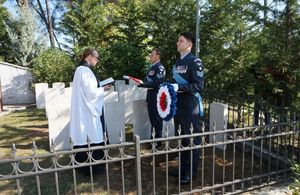Air Gunner on board secret WW2 flight identified and buried in Albania
Sgt Peter Twiddy is buried in Tirana, Albania.

Members of the Royal Air Force's Queen's Colour Squadron attend Sgt Twiddy's burial.
On Wednesday 20 October, on what would have been his 100th birthday, Sergeant (Sgt) Peter Twiddy RAFVR, was finally laid to rest with military honours by members of the Queen’s Colour Squadron, Royal Air Force during a service that was organised by the MOD’s Joint Casualty and Compassionate Centre (JCCC), also known as the ‘MOD War Detectives’.
The ceremony took place for 22-year-old Sgt Twiddy at the Commonwealth War Graves Commission’s (CWGC) Tirana Park Memorial Cemetery, Albania and was conducted by the Reverend (Squadron Leader) Chrissy Lacey, Chaplain RAF High Wycombe.
Tracey Bowers, JCCC said:
“This has been a fascinating case to research and work on. I am grateful to the families who gave their DNA so we could identify Sgt Twiddy.
“We remember all the crew and passengers who were killed 78 years ago today on what was a brave mission.”
On the night of 19 October 1943, a Halifax HR674 aircraft was allocated to carry out a secret operaton code-named “Sapling 7”. Sgt Twiddy along with six other crewmen from No.148 Squadron accompanied two passengers, Captain A. Careless and Signalman D.W. Rockingham, who were attached to the Special Operations Executive (SOE).
The purpose of the mission was to drop supplies and the two SOE personnel. The drop zone was high in the mountains above the village of Tragjas, Albania. The aircraft took off from Tocra, Libya on 19 October 1943 at 2325 hours local time and did not return.
Attempts to trace the aircraft, including searches of the sea, came to no avail until 22 October 1943 when a signal was received from the field telling that the plane had crashed in the early hours of 20 October with the loss of all persons on board.
Following information about the location of the Halifax crash site given to the Defence Section in Tirana, a team from the Embassy deployed to investigate. Human remains were recovered from the wreckage and DNA was used to confirm they were those of Sgt Peter Twiddy.
The family of Sgt Peter Twiddy said:
“ We are all grateful a positive DNA match was obtained and the mystery as to what happened all those years ago to our brave family member has been finally solved.”
The Reverend Lacey said:
“For 78 years Sgt Twiddy’s resting place has been unknown. Now, on his special day (the anniversary of both his birth and death), we come together to say that he is known; at his final resting place we recognise the ultimate sacrifice he made. We stand in remembrance in the peace which he and the crew gave their lives for, and pray that will have peace as they rest.”
Peter Twiddy was born on 20 October 1921 in Stockwell, Surrey, to Albert Arthur Twiddy and Elsie Edith Ward. Peter had one older sister who died as an infant and a younger brother, Eric, who died in 2013 aged 89. Throughout his career Peter’s character was always described as very good. Peter was killed on his 22nd birthday.
The grave will be marked by a headstone provided by the CWGC, who will care for his final resting place in perpetuity.
Mel Donnelly, CWGC’s Commemorations Case Manager, said:
“On this significant date, Sgt Twiddy can now be laid to rest. We are proud to be able to mark his grave with a CWGC headstone bearing his details and a personal inscription chosen by his family, ensuring that neither he nor his sacrifice will ever be forgotten.”